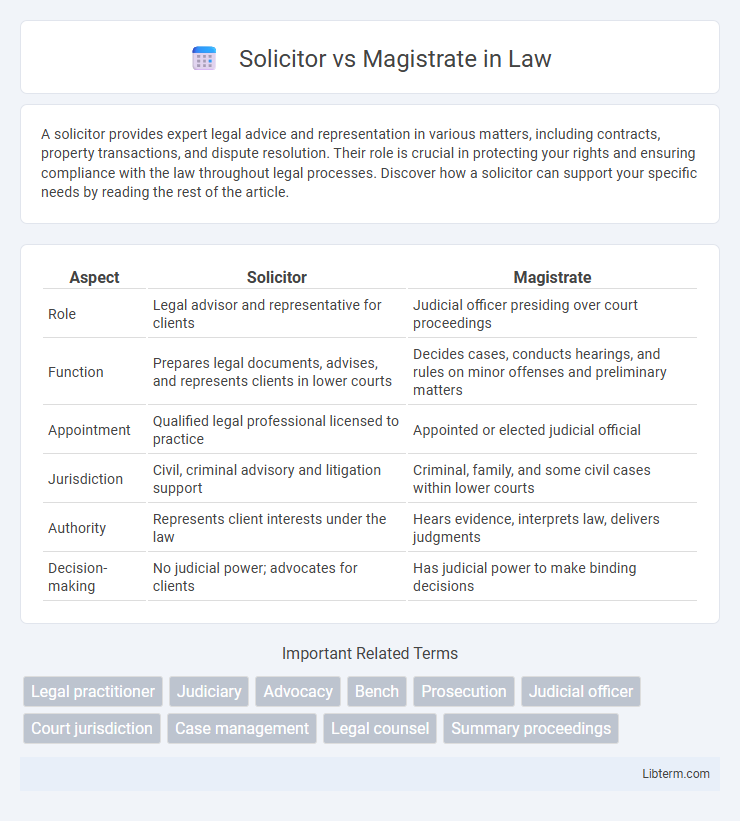A solicitor provides expert legal advice and representation in various matters, including contracts, property transactions, and dispute resolution. Their role is crucial in protecting your rights and ensuring compliance with the law throughout legal processes. Discover how a solicitor can support your specific needs by reading the rest of the article.
Table of Comparison
| Aspect | Solicitor | Magistrate |
|---|---|---|
| Role | Legal advisor and representative for clients | Judicial officer presiding over court proceedings |
| Function | Prepares legal documents, advises, and represents clients in lower courts | Decides cases, conducts hearings, and rules on minor offenses and preliminary matters |
| Appointment | Qualified legal professional licensed to practice | Appointed or elected judicial official |
| Jurisdiction | Civil, criminal advisory and litigation support | Criminal, family, and some civil cases within lower courts |
| Authority | Represents client interests under the law | Hears evidence, interprets law, delivers judgments |
| Decision-making | No judicial power; advocates for clients | Has judicial power to make binding decisions |
Understanding the Roles: Solicitor vs Magistrate
A solicitor provides legal advice, prepares documents, and represents clients in lower courts, focusing on client advocacy and case management. A magistrate acts as a judicial officer who presides over court hearings, makes rulings, and adjudicates minor criminal and civil cases based on the law. Understanding the distinct functions of solicitors and magistrates is essential for navigating legal procedures effectively within the justice system.
Key Responsibilities of a Solicitor
Solicitors provide expert legal advice, draft documents, and represent clients in lower courts, ensuring compliance with legal procedures. They conduct negotiations, prepare cases, and liaise with barristers to build strong legal arguments. Solicitors also manage client communication, handle contracts, and facilitate dispute resolution outside court.
Primary Functions of a Magistrate
A magistrate primarily presides over lower courts, handling criminal and civil cases, overseeing preliminary hearings, bail applications, and minor offenses. They ensure justice is administered fairly by managing legal proceedings, interpreting laws, and making binding decisions. Unlike solicitors who provide legal advice and representation, magistrates serve as judicial officers responsible for adjudication and courtroom management.
Education and Training Requirements
Solicitors must complete a law degree or a conversion course followed by the Legal Practice Course (LPC) and a two-year training contract with a law firm. Magistrates do not require formal legal qualifications but undergo specific local training programs and mentoring to understand court procedures and legal principles. The professional path for solicitors is more academically rigorous, while magistrates rely on community appointment and practical orientation.
Day-to-Day Duties: A Comparison
Solicitors primarily provide legal advice, draft documents, and represent clients in lower courts, managing case preparations and client consultations daily. Magistrates oversee court hearings, make decisions on bail, fines, and sentencing, and ensure the smooth administration of justice in magistrate courts. The solicitor's role is client-focused and preparatory, while the magistrate's duties center on judicial decision-making and courtroom management.
Legal Authority: Solicitor vs Magistrate
A solicitor holds legal authority to provide expert legal advice, represent clients, and prepare legal documents, often acting as an intermediary between clients and the courts. In contrast, a magistrate possesses judicial authority to preside over lower court proceedings, make determinations on minor criminal cases, civil disputes, and preliminary hearings, ensuring lawful administration of justice. While solicitors advocate on behalf of parties, magistrates exercise decision-making power to interpret laws and administer rulings within their jurisdiction.
Courtroom Presence and Involvement
Solicitors primarily handle legal paperwork, client consultations, and case preparation outside the courtroom, with limited courtroom presence except in specialized tribunals or preliminary hearings. Magistrates serve as judicial officers presiding over lower courts, actively leading hearings, making rulings, and ensuring legal procedures are followed during trials. The distinction in courtroom involvement highlights solicitors' advisory role versus magistrates' authoritative decision-making position within the judicial process.
Decision-Making Powers
Solicitors provide legal advice and representation but do not possess decision-making powers in court proceedings. Magistrates, as judicial officers, hold authority to make binding decisions on matters such as criminal cases, family disputes, and preliminary hearings. Their role includes interpreting law, assessing evidence, and issuing rulings or sentences within the scope defined by legislation.
Career Paths and Opportunities
A solicitor primarily provides legal advice, drafts documents, and represents clients outside court, offering career opportunities in law firms, corporate legal departments, and government agencies. Magistrates preside over lower courts, making judicial decisions on minor criminal and civil matters, typically holding part-time positions often filled by legally trained volunteers or professionals with legal experience. Career progression for solicitors can lead to becoming barristers or judges, while magistrates may pursue roles as district judges or move into broader judicial appointments.
Choosing Between a Career as a Solicitor or Magistrate
Choosing between a career as a solicitor or magistrate involves assessing one's passion for advocacy versus judicial decision-making. Solicitors specialize in providing legal advice, drafting documents, and representing clients in various legal matters, often requiring strong negotiation and research skills. Magistrates, on the other hand, serve as judicial officers responsible for hearing cases, interpreting laws, and delivering judgments, demanding impartiality, critical thinking, and deep knowledge of legal procedures.
Solicitor Infographic

 libterm.com
libterm.com